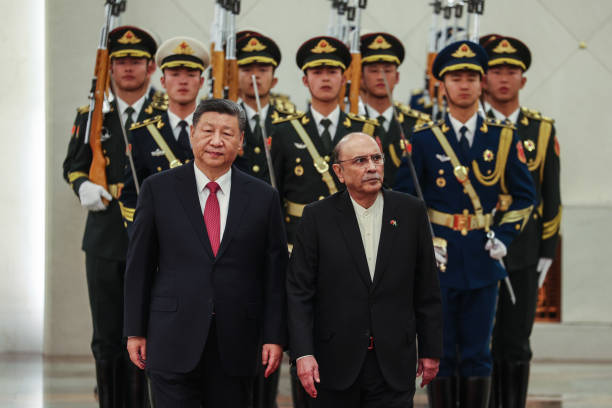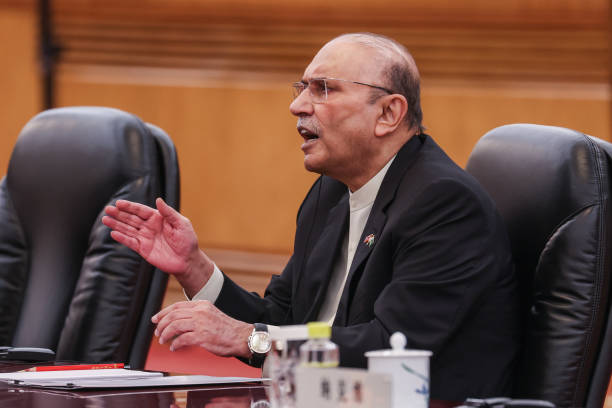Asif Ali Zardari
Asif Ali Zardari, a prominent figure in Pakistan’s political landscape, has had a remarkable career marked by both political triumphs and controversies. As the co-chairman of the Pakistan People’s Party (PPP) and former President of Pakistan, his life and career have been at the intersection of politics, governance, and the country’s turbulent history. His legacy, however, is complex, shaped by both his actions and the perceptions surrounding his leadership. This essay aims to explore the life and political career of Asif Ali Zardari, assessing his rise to power, his tenure as president, and his lasting impact on Pakistan’s political arena.
Economic history & childhood experiences
Born on July 26, 1955, in Karachi, Pakistan, Asif Ali Zardari hails from a politically influential family. His father, Hakim Ali Zardari, was a wealthy landowner and a well-connected businessman. Zardari’s mother-in-law, Benazir Bhutto, was Pakistan’s first female prime minister and a key political figure in the country. Zardari’s marriage to Benazir Bhutto in 1987 further elevated his political profile, positioning him within the political elite of Pakistan.
Asif Ali Zardari’s political career began in the late 1980s and early 1990s when he was actively involved in the PPP. While his political role remained somewhat subdued during Benazir Bhutto’s first term as prime minister, he gradually became a central figure within the party due to his association with Bhutto and his role as her husband.

Political Ascent and Jail Time
Zardari’s rise to political prominence was not without controversy. In 1990, during Benazir Bhutto’s first term as Prime Minister, Asif Ali Zardari was accused of corruption and mismanagement of state affairs. These allegations led to his imprisonment in 1990 under the regime of then-President Ghulam Ishaq Khan. Zardari spent several years in jail, although he was never formally convicted of any crime. His time in prison only served to increase his notoriety, and he became a symbol of political persecution.
During his imprisonment, Benazir Bhutto’s political career also faced significant challenges, including her removal from office in 1996. In 1997, after Bhutto’s government was overthrown, Zardari was released from prison, and he immediately became a pivotal player in PPP politics. Zardari continued to maintain a strong hold on the party despite his controversial image and accusations against him.
Governance and the Presidency
Asif Ali Zardari’s most significant political achievement came when he became the President of Pakistan. After the tragic assassination of his wife, Benazir Bhutto, in December 2007, Zardari assumed leadership of the PPP. In 2008, following the PPP’s victory in the general elections, Zardari was elected President of Pakistan. His rise to the presidency was marked by a fragile political environment, with the country grappling with economic crises, rising militancy, and tensions with neighboring India.
Zardari’s tenure as president, which lasted from 2008 to 2013, was characterized by several key events and challenges. His government inherited a fragile economy, with inflation and unemployment at high levels. Zardari’s leadership also faced criticism for its handling of national security concerns, including the ongoing fight against terrorism and extremism. The government’s inability to resolve issues like energy shortages, corruption, and poverty further tarnished Zardari’s reputation.
One of the most notable aspects of Zardari’s presidency was the passage of the 18th Amendment to the Constitution in 2010. This amendment reduced the powers of the president, transferring more authority to the office of the prime minister. While this was seen as a positive step toward restoring parliamentary democracy in Pakistan, it was also viewed by some as a political move to strengthen Zardari’s grip on power by weakening his opponents.
Political Difficulties and Debates
Zardari’s presidency was marred by numerous controversies. He faced repeated accusations of corruption, with critics often referring to him as “Mr. 10 Percent,” a term linked to his alleged role in taking bribes during his wife’s tenure as prime minister. Though no formal charges were ever proven, these allegations persisted throughout his presidency, leading to widespread disillusionment among the public. Additionally, his style of governance was often described as highly centralized, with Zardari maintaining tight control over the PPP and its policies.
During Zardari’s time in office, Pakistan experienced numerous crises, including devastating floods in 2010, which caused widespread destruction, and continued militant attacks that destabilized the region. His inability to effectively manage these crises and restore confidence in the government led to growing frustration within the public and opposition parties.
Despite these challenges, Zardari managed to hold on to power until 2013, when he opted not to seek re-election. His decision to step down was widely seen as a move to preserve his political legacy and ensure a smooth transition of power, allowing his party to maintain influence even after his departure from the presidency.

The Legacy and After-Presidency
After his presidency, Zardari continued to be an influential figure in Pakistan’s political landscape. He remained the co-chairman of the PPP, working to maintain the party’s presence and influence, particularly in the Sindh province. His political fortunes have been closely tied to the PPP’s ability to remain relevant in Pakistan’s shifting political environment. However, his leadership style, marked by autocratic tendencies and the persistence of corruption allegations, has kept him at the center of both support and criticism.
Asif Ali Zardari’s legacy is highly contentious. To his supporters, he is seen as a survivor of political adversity and a leader who kept his party intact during some of the most challenging times in Pakistan’s history. His role in the 18th Amendment and his tenure as president also earned him recognition for his contribution to restoring parliamentary democracy.
To his detractors, Zardari is often viewed as a symbol of political corruption and inefficiency. His presidency is frequently cited as a period when Pakistan’s governance and economy struggled, and his personal wealth and controversial dealings have contributed to his reputation as a politically opportunistic figure.
Final Thoughts
Asif Ali Zardari’s life and career have been intertwined with the political history of Pakistan. From his early days as the husband of Benazir Bhutto to his controversial presidency, Zardari has shaped and been shaped by the challenges of leading a country marked by instability and economic turmoil. His political legacy remains a subject of debate, with some viewing him as a protector of democracy and others as a figure symbolizing corruption and mismanagement. Regardless of the differing opinions on his rule, Zardari’s influence on Pakistani politics is undeniable, and his legacy will continue to be a topic of discussion for years to come.

